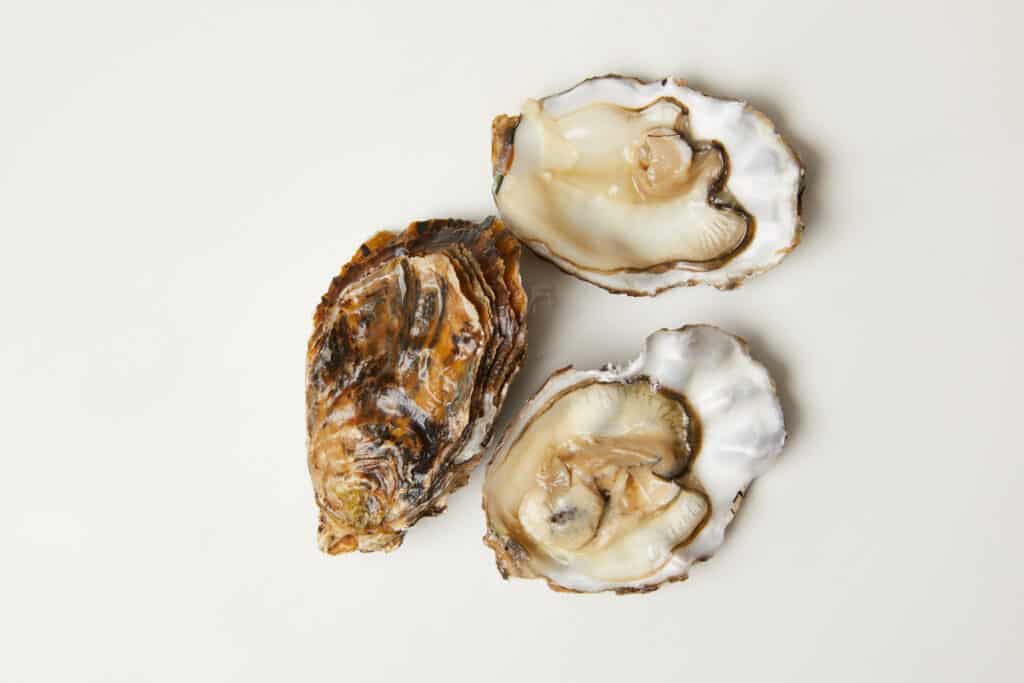Veganism is all about making choices and, ultimately, where people decide to draw lines. The question of whether or not oysters are vegan is a good illustration of this.
At first glance, the question seems a straightforward one. The UK’s Vegan Society (the oldest such society in the world) defines a vegan as a person who avoids “all animal foods such as meat (including fish, shellfish and insects), dairy, eggs and honey – as well as avoiding animal-derived materials, products tested on animals and places that use animals for entertainment.”
Oysters, meanwhile, are salt-water bivalve mollusks belonging to the same family as snails, slugs, and octopuses. So, clearly animals and therefore not suitable for vegans, right?
According to some authorities, the answer is not so simple… read on to discover all about the long-running debate about whether vegans can, or cannot, eat oysters. But first, let’s make it clear exactly what an oyster is.
What is an oyster?

Oysters are bivalve invertebrates (meaning they don’t have heads or spinal columns). They are found throughout the shallow waters of the world’s oceans and normally live in colonies called reefs or beds. Their rough, hard shells contain a slimy body, and it is hard to imagine how such a thing appeared a potential food option to the first human who decided to try them out.
Despite their off-putting appearance, oysters, eaten both raw and cooked, have become popular food wherever they are found around the world. Archaeological evidence shows that Australian Aborigines in New South Wales were eating oysters at least 10,000 years ago. By the late 19th century, New York City would have six million oysters up for sale every single day, as they became a staple food of the city’s rapidly growing working-class population.
Particularly commonly eaten species around the world include the American oyster, which is found along the Atlantic coasts of both the North and South American continents, the Pacific oyster, which covers an equally diverse range of the world’s largest ocean, and the Sydney Rock Oyster.
Oysters are curious animals by any definition. They feed by filtering food particles from the water as it washes over them, breed by broadcast spawning when that water warms up, and, most curiously of all, change their gender several times during their lifespan. The presence of sperm and eggs in an oyster’s reproductive organs means that it is technically possible for one oyster to fertilize itself. Oyster colonies also provide a rich habitat for hundreds of other species of small marine animals.
Although oysters are not endangered, they are highly susceptible to changes in water quality through pollution. They also retain many toxins in their body, which explains why, despite being naturally rich in nutrients, there are significant health issues associated with humans eating oysters.
Why do some people argue that vegans can eat oysters?
Although oysters are animals, there are some people who consider themselves vegan who still eat them. Such vegans (or “seagans” as they are sometimes called) argue that the fact that oysters do not have brains or advanced central nervous systems means that they have neither sentience nor the ability to feel pain. Some have argued, like chef/restauranter Jackson Boxer, that “there is a case for saying [that oysters are] less sentient even than trees.”
Without sentience or an advanced central nervous system, so the argument goes, oysters cannot suffer. Therefore, eating them is, according to some, still consistent with a vegan diet. The question of whether oysters can feel pain has not been conclusively settled. Some recent research suggests oysters’ nervous systems do react to substances that might do them harm, although that does not prove that they feel pain.
Another thing to consider is that 95% of oysters eaten in the world are farmed. Normally, vegans would be opposed to any form of animal farming. But some argue that oyster farming is good for the environment, as it helps to filter water and take nitrogen and CO2 from the environment. Although most vegans would not consider even positive aspects of any animal farming to be sufficient justification for such practices.
The whole debate around oysters is nothing new in vegan circles, in fact, it may even predate the concept of veganism itself. Buddhist monasteries that practice millennia-old traditions of avoiding harming sentient beings have been known to serve oysters, on precisely the grounds that they are not sentient.
Vegan advocates of eating oysters may have always been in the minority, but the debate continues to go on.
So, are oysters vegan or not?
Clearly, people will continue to have their own opinions on this question. Perhaps a case could be made that eating oysters does not contradict the compassionate spirit of veganism. But, ultimately, as oysters are animals, eating them does definitely contradict the simple definition of the term “vegan”.
Acknowledging the complexity of the debate, Peter Singer, the influential Australian philosopher and author of Animal Liberation, said in an interview in 2009, “It’s hard to imagine [oysters] can feel pain. But if you have doubts about it, don’t eat them.”
Perhaps we should leave the final word to the UK Vegan Society, which stated in response to the specific question about oysters: “Veganism is about rejecting the notion that animals are food or products, therefore we don’t view oysters as something to eat.”
Therefore, for the simple reasons that oysters are animals and that eating animals is not vegan, we can conclude that oysters are not suitable food for vegans.
So, there you have it, eating oysters cannot be considered vegan. Or can it? Let us know what you think in the comments below.











I’m not vegan, though I was for years.
I was surprised when I first learned this, but now it makes a lot of sense. Trees are possibly more sentient than oysters to be certain, and something like mycelium is much closer to conscious then an oyster. Should vegans cut out mushrooms or eat oysters? I don’t really care. I appreciate that a growing number of people are eating thoughtfully.